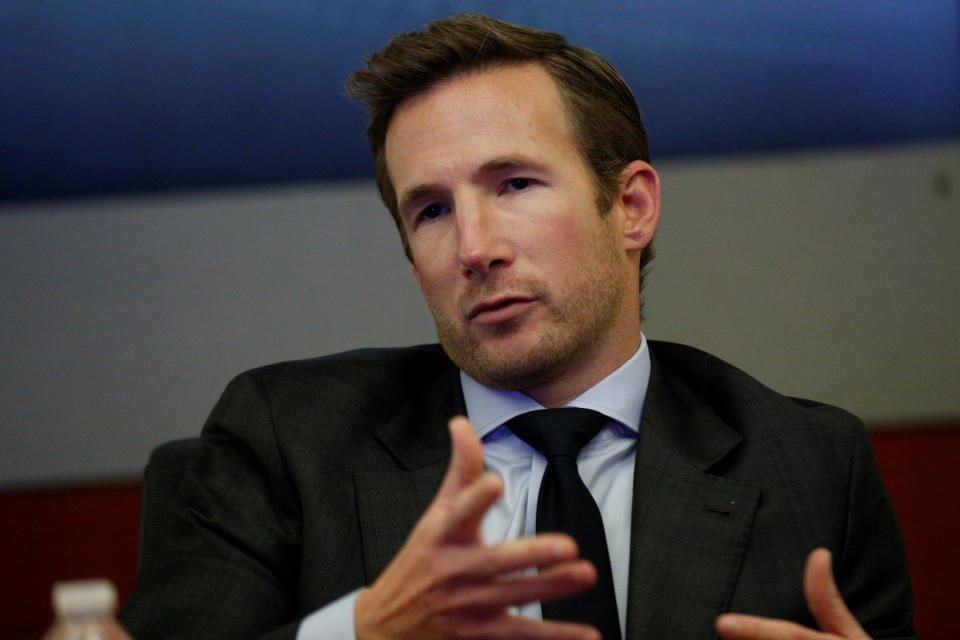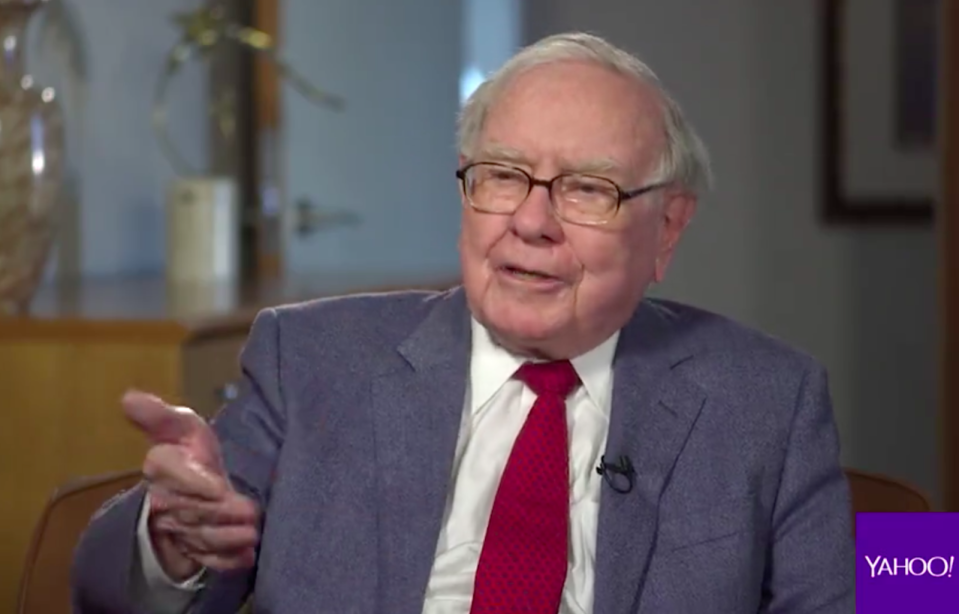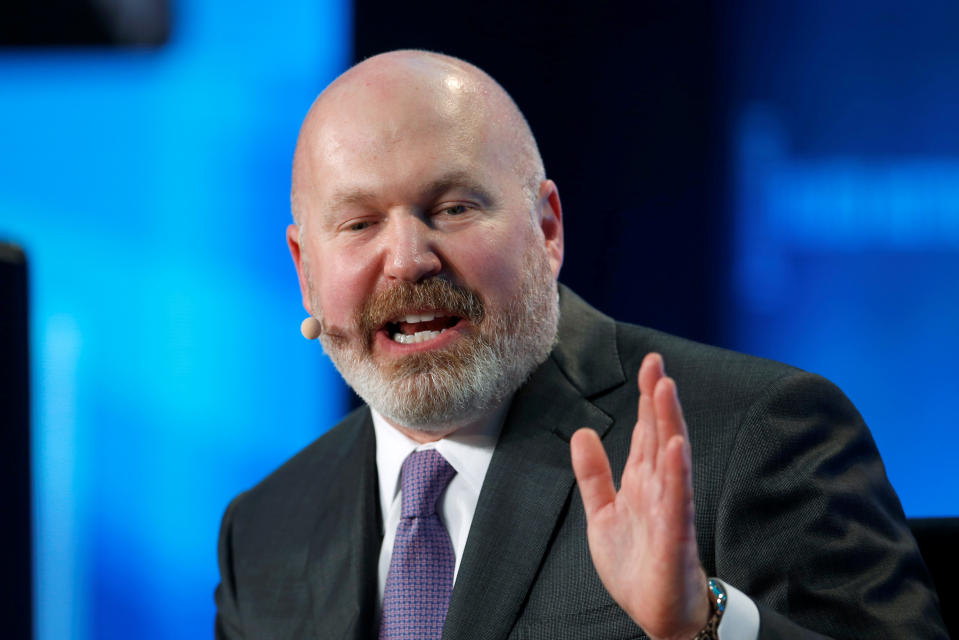Why high-cost money managers aren't worried about the passive investing boom

It’s a mistake for investors to dismiss the entire hedge fund industry because it has underperformed the stock market in recent years. There’ll come a time when the market won’t be so kind to those invested in low-cost, passively-managed index funds. And when that time comes, what appears to be exorbitant fees charged by fund managers will seem totally justified.
This conclusion was one of the important takeaways from the Bloomberg Invest Summit last Tuesday and Wednesday.
This ongoing conversation is occurring in a market backdrop where index exchange-traded funds (ETFs) have become massive as the stock market (^GSPC) has rallied for over eight years. Stock-picking, active fund managers have seen their picks get lost in a rising market that has lifted all boats. It’s a tide that has seen billions flow out of actively-managed funds and into passively-managed funds.
“I’m 100% convinced that is only because the stock market has done nothing but go up since ’08 in a straight line,” Michael Bloomberg said at the Bloomberg Invest Summit. “And if any money manager knew it was going to do that, you’d just buy the S&P ETFs and go play golf.”
Until something turns, the matters of high costs and poor performance among hedge fund managers and those running actively-managed mutual funds will continue to be widely publicized, encouraging investors to seek low-cost options. And professionals in this industry need to understand this is just part of the job.
“That’s what capitalism is all about,” Bloomberg added.
Where’s the alpha that investors are paying for?
Investors may hope that the hedge funds they select will beat the market, but this is rarely the stated objective of most hedge fund managers. Most promise to deliver a specialized kind of performance that is agnostic to what the market may be doing.
But regardless of the services money managers selling, investors—like pension funds and endowments—want alpha. But they haven’t been getting that from hedge fund investments in recent years.
“You’ve got to make some money for us to view it as true alpha,” Marc Levine, the chairman of Illinois State Board of Investment pension fund, said at the Bloomberg Invest Summit. Levine noted that the $20 billion fund lowered its allocation target for hedge funds to 3% from 10% while also reducing its number of hedge fund investments to 17 from a “ridiculous” 81.
A simple way of explaining alpha is excess return. Hedge fund manager Jason Karp, the founder of Tourbillon Capital, said another way of putting it is “a return that’s not explained by the market.”
“In the last ten years, a lot of things like value, growth, dividend type investing have become betas now because the rise of passive has created a lot of ETFs where you can actually replicate all these different factors, and you recreate these returns much more cheaply than you used to be able to do,” Karp said at the same Bloomberg event.
In other words, trading value, growth or dividend strategies were once ways to get a return in excess of a broad market index like the S&P 500. Fund managers could charge high fees for this service. Now, those strategies have themselves become cheaply tradable indexes.

He continued: “I would add on the definition of, ‘Can you replicate someone’s returns easily with two or three ETFs? Where you can actually measure the amount of variance in their returns that you can actually correlate to specific ETFs?’ And if you can replicate someone’s returns with the Nasdaq 100 that you can buy for three basis points and be infinitely liquid, then that’s not alpha.”
So, the opportunities professionals have to generate alpha are shrinking.
It feels like fund managers are ‘eating the whole pie’
Lackluster performance tends to reignite the age-old debate about cost structure. Hedge funds often charge investors a fee known as “2-and-20”, meaning 2% of assets (management fee) and 20% of profits (performance fee). Those fees can vary with some being lower and others being higher like 3% and 30%.
These fees become harder to justify when funds aren’t delivering alpha (and indexing is cheap). When the alpha on manager’s investment decisions are low, much of it gets eaten up by the fees before any money lands in the investor’s pocket.
“If we’re making net alpha 50 [basis points] — 100 [basis points] and we are paying 2-and-20 — there’s a gross alpha pie being created and the other guy is eating the whole pie!” Levine said. “And that’s not fair. That’s not right. We manage money for 130,000 beneficiaries and I think they deserve at least half the pie.”

Warren Buffett, the CEO of Berkshire Hathaway, has also been a critic of hedge funds and their fees. The 86-year-old multibillionaire has argued that it’s odd that if you have $1 billion in assets under management, you get paid $20 million just for terrible performance.
“In any other field, that would just blow your mind,” Buffett said last month at Berkshire’s annual shareholders’ meeting. “People get so used to it in the field of investment.”
Buffett has long recommended that both large and small investors put their money in low-cost index funds, like those offered by Bogle’s Vanguard.
Meanwhile, some funds are breaking away from the traditional 2-and-20 model to better accommodate investor expectations. For example, Karp’s Tourbillon Capital offers two funds, including a long alpha fund that only collects a performance fee only if it beats a blended benchmark of the MSCI World Index and the S&P 500.
The fees are easily defensible in certain markets
Karp also offers a long/short equity fund, which doesn’t really have a benchmark to measure against. He pointed out that hedge funds that actually hedge or have a lower net exposure to the market aren’t going to have returns that are “as pretty” as those that are just long the index during a bull market.
Instead, Karp thinks the “true measure” of success can be measured during sustained periods of economic recession, anemic growth, or market downturns that last longer than a quarter. During these times, investors should ask, “Is the hedge fund providing you a diversifier and a service that you can’t easily replicate by holding puts or some form of insurance?”
Bloomberg, who described himself as bearish for the “last half dozen years,” expects that at some point things will turn and the fees will be justified.
“That’s when you want to hire people with active management,” Bloomberg said. “And 2-and-20 if that’s what you’ve got to pay, or 3-and-30, anything that gets you alpha, you’re going to do that.”
The market needs active management, but it isn’t for everyone
Quantitative investor Cliff Asness, the CIO of AQR Capital, has been a vocal critic of hedge funds charging alpha fees while delivering beta performance. But this time, he gave somewhat of a defense of managers aiming to beat the market, noting that it’s an “oversold story” that active managers aren’t needed at all.
“I am, by the way, beginning to think that I’m being a bit of an apologist for them because I am one of those people who thinks we need a certain amount of active management,” Asness said on his panel at Bloomberg. “The world is not going to be all cap-weighted, and it’s not going to be all quant. Somebody has got to actually look at companies.”
It’s not a “radical view,” he added, pointing to recent comments Vanguard founder Jack Bogle made about indexing. Last month, Bogle told Yahoo Finance’s editor-in-chief Andy Serwer that if everybody indexed it would be “chaos” and “catastrophe.” Bogle noted that one-quarter of the U.S. stock market is currently indexed. He estimated that he would be comfortable if indexing got to 75%.
“I’ll go with Jack,” Asness said. “We need active management. We need good active management.”

At the Summit, Joel Greenblatt, co-CIO of long/short equity Gotham Asset Management, agreed with Buffett’s recommendation that most people should index. Though, he pointed out that Buffett doesn’t index and neither does his firm.
Ultimately, picking an investment manager or investment strategy is about understanding what you’re getting into and committing.
“The big picture is the strategy that makes the most sense for you is not only one that makes good sense, but one you can stick with, ” Greenblatt said. “The problem with active management, in general, is if you’re going to beat the market you have to do something different. You have to zig and zag differently.”
For now, most professionals agree the sentiment towards higher-cost investment options will continue to be negative for the the time being.
“The fact [this move to passive investing] has gotten so much press will help it continue. I think it makes a lot of sense for people who don’t understand the strategies they’re following. I think that goes for most people. I think to some extent there will be a continued move.”
Ironically, this trend of blindly buying broad-market indexes may be what the alpha-hunting active managers need.
“When people aren’t discerning among stocks that have different fundamentals, you can create opportunities,” Greenblatt said.
—
Julia La Roche is a finance reporter at Yahoo Finance. Follow her on Twitter.

